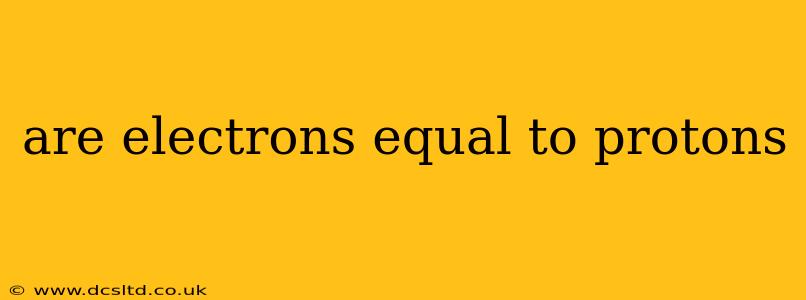Are Electrons Equal to Protons? A Deep Dive into Subatomic Particles
The short answer is no, electrons are not equal to protons. While both are fundamental subatomic particles that make up atoms, they possess significantly different properties. Understanding these differences is crucial to grasping the fundamental nature of matter.
This article will explore the key distinctions between electrons and protons, addressing common questions surrounding their similarities and differences. We'll delve into their charge, mass, location within the atom, and their roles in chemical reactions.
What is the charge of an electron versus a proton?
This is a key difference. Electrons carry a negative charge (-1), while protons carry a positive charge (+1). This fundamental difference in charge is what allows atoms to form bonds and create molecules. The attraction between negatively charged electrons and positively charged protons holds the atom together. Neutrons, the third type of subatomic particle, have no charge (neutral).
What is the mass of an electron compared to a proton?
The mass disparity is substantial. A proton is approximately 1836 times more massive than an electron. This difference in mass has significant implications for the behavior of atoms and molecules, influencing their movement and interactions. The electron's relatively small mass contributes to its wave-like properties, described in quantum mechanics.
Where are electrons and protons located in an atom?
Electrons and protons reside in different regions of the atom. Protons reside within the atom's nucleus, a dense central core, along with neutrons. Electrons, on the other hand, occupy the space surrounding the nucleus in what are called electron shells or orbitals. These orbitals are regions of probability where an electron is most likely to be found, not fixed locations. The arrangement of electrons in these shells dictates the chemical properties of an atom.
How do electrons and protons differ in their role in chemical reactions?
Electrons play a much more active role in chemical reactions than protons. The electrons in the outermost shell (valence electrons) are primarily involved in the formation of chemical bonds. These electrons can be shared, donated, or received during chemical reactions, leading to the formation of molecules and compounds. Protons, being tightly bound within the nucleus, are generally not directly involved in these processes. However, the number of protons (atomic number) defines the element itself and its chemical properties.
Are electrons and protons made of the same things?
No, while both are considered fundamental particles within the Standard Model of particle physics, their composition differs in that they are not made of smaller constituents. Both are considered elementary particles, meaning that they are not composed of other particles. This is different from protons, which are composed of quarks. Electrons are leptons, while protons are baryons.
Can electrons and protons be converted into each other?
Under normal circumstances, electrons and protons cannot be converted into each other. However, in certain high-energy processes, such as those occurring in nuclear reactions or particle accelerators, transformations involving protons and other particles can take place. This is governed by the laws of physics governing fundamental interactions, such as the weak nuclear force. These processes are highly specialized and don't happen under everyday conditions.
In conclusion, while both electrons and protons are essential components of atoms, their fundamental differences in charge, mass, location, and role in chemical reactions make them distinct subatomic particles. They are not equal, and their contrasting properties are fundamental to the structure and behavior of matter.
